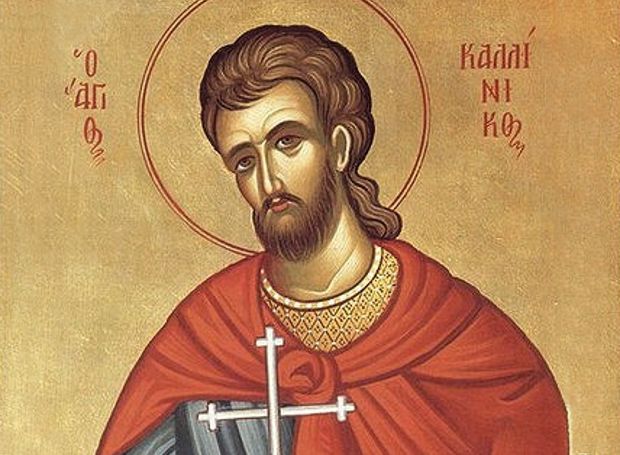Martyr Callinicus of Gangra in Asia Minor (29 July)


The Holy Martyr Callinicus, a native of Cilicia, was raised from childhood in the Christian Faith. Grieving that many misguided people would perish for eternity because they worshiped idols, he went through the cities and villages to proclaim Jesus Christ and His teachings to the pagans, and with the Word of God he converted many to Christianity.
In the Galatian city of Ancyra the holy confessor was arrested and brought to trial before a governor named Sacerdonus, a fierce persecutor of Christians. The governor, threatening tortures and death, ordered the saint to offer sacrifice to the idols. The saint fearlessly declared that he was not afraid of martyrdom, since every believer in Christ receives from Him strength in ordeals, and through death inherits an eternal blessed life.
They cruelly beat the saint with ox thongs and tore at his body with iron hooks, but he endured everything with patience and calm. This aroused still greater fury in Sacerdonus, and he ordered that sandals with sharp nails be placed on the saint’s feet, and that they should drive the martyr with whips to the city of Gangra to be burned.
The pathway was arduous, and the soldiers who accompanied the condemned man were weak from thirst. In despair they began to implore the saint to pray the Lord for water. The saint, taking pity on his tormentors, with the help of God caused a miraculous spring of water to gush forth from a stone. The astonished soldiers were filled with sympathy for their rescuer, and they wanted even to set him free. Fear of execution, however, compelled them to bring the martyr farther. In Gangra, Saint Callinicus joyfully offered thanks to the Lord, Who had vouchsafed him the crown of martyrdom. He went into the blazing fire and gave up his soul to God. His body, remaining unharmed, was reverently buried by believers.
Saint Callinicus was from Cilicia. Because he preached Christ and turned many pagans away from the idols, he was seized by Sacerdon the Governor, who subjected him to many tortures, then had him shod with shoes in which nails had been fixed upright, and compelled him to run to the city of Gangra, where he was burned alive in a furnace.


Callinicus was born in Cilicia. He was raised from his early youth in Christian piety. Abandoning all, he went forth to preach the Holy Gospel. In Ancyra the pagan Prince Sacerdos arrested him. When the prince threatened him with cruel tortures if he did not worship the idols, St. Callinicus answered him: “To me, suffering for my God is most welcome, as bread is to a hungry man.” After consigning him to cruel tortures and beatings, the prince had iron shoes, with nails protruding inside, placed on Callinicus’s feet.
Then he ordered that he be driven to the city of Gangra, for the prince was afraid to torture him anymore, or to kill him in Ancyra–for many, observing the heroic patience of this holy man, had already converted to the Christian Faith. Along the way the soldiers became thirsty, but there was no water. St. Callinicus prayed to God, and brought forth water from a rock. When they arrived in Gangra, the torturers prepared to throw St. Callinicus into a fiery furnace.
The saint prayed to God, saying: “I give thanks to You, O Heavenly Father, for making me worthy of this hour, in which I die for Your holy name.” Then he entered the fire. When the fire died down, they found his dead body whole and unharmed by the fire. He suffered honorably, and was crowned with the wreath of eternal glory in about the year 250 A.D.
Apolytikion of Martyr Callinicus
Fourth Tone
Thy Martyr, O Lord, in his courageous contest for Thee received as the prize the crowns of incorruption and life from Thee, our immortal God. For since he possessed Thy strength, he cast down the tyrants and wholly destroyed the demons’ strengthless presumption. O Christ God, by his prayers, save our souls, since Thou art merciful.
Source: oca.org / goarch.org /westserbdio.org





